大学英语4 考试必背句型 重点
大学英语四级翻译常用句型
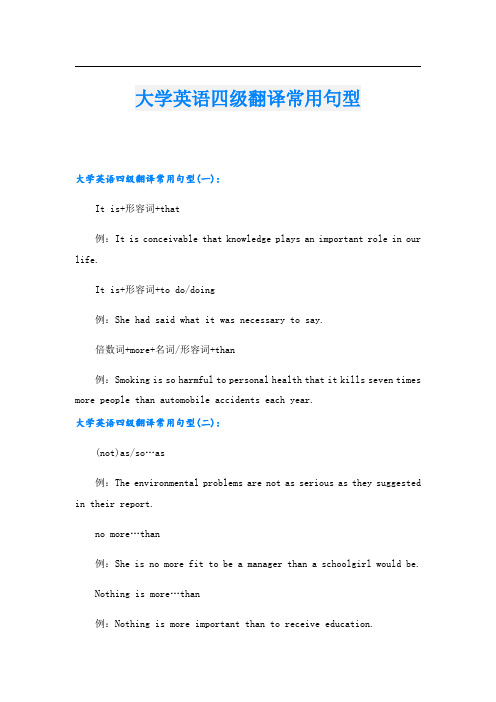
大学英语四级翻译常用句型大学英语四级翻译常用句型(一):It is+形容词+that例:It is conceivable that knowledge plays an important role in our life.It is+形容词+to do/doing例:She had said what it was necessary to say.倍数词+more+名词/形容词+than例:Smoking is so harmful to personal health that it kills seven times more people than automobile accidents each year.大学英语四级翻译常用句型(二):(not)as/so…as例:The environmental problems are not as serious as they suggested in their report.no more…than例:She is no more fit to be a manager than a schoolgirl would be.Nothing is more…than例:Nothing is more important than to receive education.大学英语四级翻译常用句型(三):without/not so much as例:Disappointed with her husband,Mary left home without so much as looking back at him.only to find/see例:He spent almost all his money to buy the hen which was said to be able to lay goldeggs,only to find it could not lay eggs at all.感官动词+of+名词例:They hurriedly escaped into a cave that smelt of terror.大学英语四级翻译常用句型(四):rather than例句:Rather than pursue money to achieve happiness,we should focus on the improvement ofourselves.(The)chances are that例句:Chances are that she has already known it,and there is no need for us to keep thesecret.It occurred to sb. that例句:It had never occurred to Marry she would become a princess someday.大学英语四级翻译常用句型(五):rather than例句:Rather than pursue money to achieve happiness,we should focus on the improvement ofourselves.(The)chances are that例句:Chances are that she has already known it,and there is no need for us to keep thesecret.It occurred to sb. that例句:It had never occurred to Marry she would become a princess someday.大学英语四级翻译常用句型(六):not… but…例句:To our disappointment, the plan caused not development but destruction.When it comes to…例句:When it comes to physics, I know nothing.be not much of a…例句:Mike is not much of a teacher for he often skips from one subject to another.猜你感兴趣:1.大学英语四级翻译常考句型2.英语四级必背句子大全3.大学四级英语翻译专练题附译文4.大学英语四级万能句型精选5.大学英语四级翻译训练附答案。
大学英语四级作文高分句型

大学英语四级作文高分句型大学英语四级作文必备高分句型在日常生活或是工作学习中,大家或多或少都会接触过作文吧,作文是经过人的思想考虑和语言组织,通过文字来表达一个主题意义的'记叙方法。
你写作文时总是无从下笔?下面是店铺为大家整理的大学英语四级作文必备高分句型,欢迎大家分享。
1. 我深信...I am greatly convinced (that)子句 =I am greatly assured (that)子句例:我深信预防是于治疗。
I am greatly convinced that prevention is better than cure.2. 在各种...之中...Among various kinds of ..., ...=Of all the ..., ...例:在各种运动中,我尤其喜欢慢跑。
Among various kinds of sports, I like jogging in particular.3.. ..是很容易证明的。
It can be easily proved (that)子句例:时间最珍贵是很容易证明的。
It can be easily proved that nothing is more precious than time.4.. ..无论如何强调都不为过... cannot be overemphasized例:交通安全的重要性无论如何强调都不为过。
The importance of traffic safety cannot be overemphasized.5.就我的看法...;我认为...In my opinion, ...=To my mind, ....= As far as I am concerned, .=I am of the opinion that 子句例:就我的看法,打电动玩具既花费时间也有害健康。
In my opinion, playing video games not only takes much time but is also harmful to health.6. (A)每个人都知道...Everyone knows (that)子句(B)就我所知…As far as my knowledge is concerned, ...例:就我所知,下列方法对我帮助很大。
大学英语四级作文万能句型100条
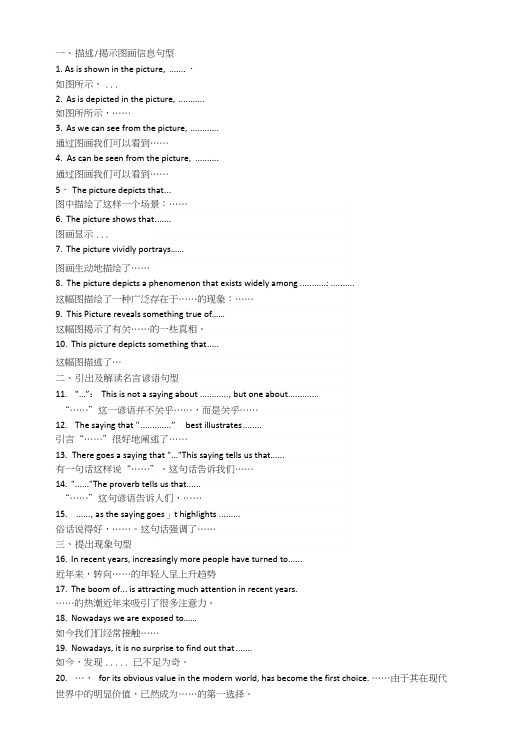
一、描述/揭示图画信息句型1.As is shown in the picture, ....... ・如图所示,...2.As is depicted in the picture, ...........如图所所示,……3.As we can see from the picture, ............通过图画我们可以看到……4.As can be seen from the picture, ..........通过图画我们可以看到……5・ The picture depicts that ...图中描绘了这样一个场景:……6.The picture shows that .......图画显示...7.The picture vividly portrays……图画生动地描绘了……8.The picture depicts a phenomenon that exists widely among ........... :..........这幅图描绘了一种广泛存在于……的现象:……9.This Picture reveals something true of……这幅图揭示了有关……的一些真相。
10.This picture depicts something that .....这幅图描述了…二、引出及解读名言谚语句型11."…”: This is not a saying about ............ , but one about .............“……”这一谚语并不关乎……,而是关乎……12.The saying that " ............. ”best illustrates ........引言“……”很好地阐述了……13.There goes a saying that "..."This saying tells us that......有一句话这样说“……”。
大学英语四级作文高分句型 句
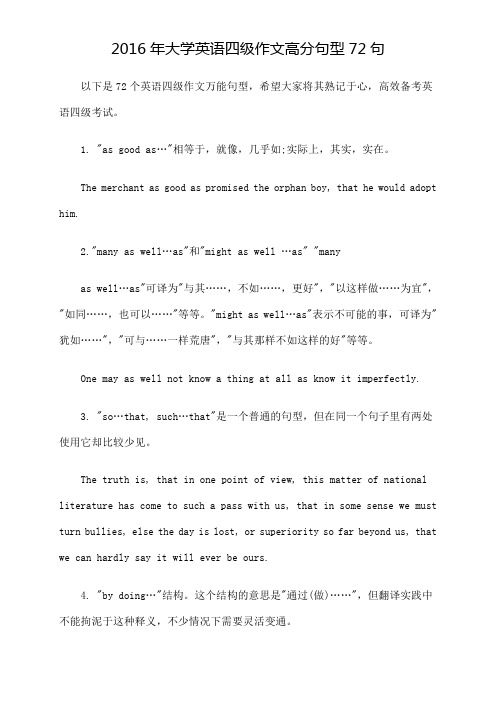
2016年大学英语四级作文高分句型72句以下是72个英语四级作文万能句型,希望大家将其熟记于心,高效备考英语四级考试。
1. "as good as…"相等于,就像,几乎如;实际上,其实,实在。
The merchant as good as promised the orphan boy, that he would adopt him.2."many as well…as"和"might as well …as" "manyas well…as"可译为"与其……,不如……,更好","以这样做……为宜","如同……,也可以……"等等。
"might as well…as"表示不可能的事,可译为"犹如……","可与……一样荒唐","与其那样不如这样的好"等等。
One may as well not know a thing at all as know it imperfectly.3. "so…that, such…that"是一个普通的句型,但在同一个句子里有两处使用它却比较少见。
The truth is, that in one point of view, this matter of national literature has come to such a pass with us, that in some sense we must turn bullies, else the day is lost, or superiority so far beyond us, that we can hardly say it will ever be ours.4. "by doing…"结构。
大学英语四级考试必备句型

大学英语四级考试必备句型英语四级考试的词汇是非常多的了,小编今天就给大家分享一下英语口语,快点来复习一下吧英语四级考试句型1、I take it you don’t agree.这么说来,我认为你是不同意。
2、It sounds like you enjoyed it.听起来你好象蛮喜欢的。
3、It looks very nice.看起来很漂亮。
4、Is everything under control?一切都在掌握之中吗?5、I thought you could do a better job.我以为你的表现会更好。
6、That might be in your favor.那可能对你有利。
7、I didn’t mean to offend you.我不是故意冒犯你。
8、I was wondering if you were doing anything this weekend.我想知道这个周末你有什么要做。
9、May I have your attention., please?请大家注意一下。
10、I am too tired to speak.我累得说不出话来。
四级英语口语考试句型1、“...” How often we hear such words like these.·······我们经常听到这样的话。
2、As the saying goes, ...常言道······3、Some people may neglect that in fact...事实上,有些人忽略了这一点4、It is high time that...该是······的时候了5、I need your help.我需要你的帮助。
大学英语四级翻译常考句型

大学英语四级翻译常考句型1. …as soon as… 一……就……1 Peter一听到消息就兴奋地喊起来; As soon as Peter heard it, he cried out excitedly.2. as…as 和……一样& not as/ so…as ……不如……1听磁带和看英语电影一样重要;Listening to tapes is as important as watching English-language movies.3. as … as possible 尽可能地……1 当你感冒的时候,你应该喝尽可能多的水;When you have a cold, you should drink as much water as possible.4. ask sb for sth…… 向某人要……1 当你不知道问题的答案时,你可以向你的老师寻求帮助;When you don‘t know the answer to any questions, you can ask your teacher for help.5、ask/tell sb. how to do sth.请/告诉某人如何做……1 Tom的爸爸经常告诉Tom应该如何正确面对问题;Tom‘s father often tells Tom how to deal with the problems in the correct way.6. ask/tell sb. not to do sth. 请/告诉某人不做某事1 我妈妈经常告诉我不要花费太多时间玩电脑游戏;My mother often tells me not to spend so much time in playing computer games.7. be afraid of doing sth. / that+从句担心某事可能产生的后果1 学生们为考试担心不足为奇;It‘s no surprise that students are afraid of having exams.8. be afraid to do sth. 害怕去/不敢去做某事1 Peter害怕在别人面前说话; Peter is afraid to speak in front of other people.9. be busy doing sth./be busy with sth. 忙于做某事/忙于某事1他正忙着通过听磁带来学习英语; He is busy studying English by listening to tapes.11…为……准备/……迟到了/对……感到歉意1 我们已经准备好聚会了; We have got ready for the party.12 高兴……1你应该高兴,你能去欧洲;You should be glad you will travel to America..13、最……之一1 他是他们班最高的孩子之一; He is one of the tallest children in his class.2 纸是最有用的发明之一; Paper is one of the most useful inventions.3 故宫是北京最有名的风景名胜之一;The Palace Museum is one of the most famous places of interest in Beijing.推荐信息4北京是中国最大的城市之一; Beijing is one of the largest cities in China.5他是跑的最快的学生之一; He is one of the students who runs fastest.14带来/送给/寄给/借给/传递/告诉某人某事物1 请递给我那支笔; Please pass me that pen.3 到达美国后请立刻给我寄一封信; Please send me a letter as soon as you get toAmerica.4他给我带来一支玫瑰; He brought me a rose.5我借给他10元钱; I lent him 10yuan.15…或者……或者;不是……就是1 要么进来,要么出去; Either come in or go out.2 我想要去巴黎或伦敦; I want to visit either Paris or London.3 你喝茶也行,喝咖啡也行; You can have either tea or coffee.4 手机不仅能打电话,还能上网;The Mobile phone is used to either make a phone call or surf the Internet.5 不是他就是你喜欢蓝色;Either you or he likes blue.16喜爱/喜欢、讨厌做某事1 我喜欢集邮;I enjoy collecting stamps.2 我讨厌排队很长时间; I hate waiting for a long time.3 她喜欢在业余时间读书; She likes reading in her spare time.4他喜欢独处;He enjoys staying alone.5妈妈不喜欢坐飞机; Mum hates taking a plane.17 完成/介意/保持/继续做某事1 你写完作业了吗Have you finished doing your homework2 关上门你介意吗 Would you mind closing the door3 每日保持锻炼对你身体有好处;Keeping doing exercise is good for your health.4抱歉,让你久等了; I‘m sorry to keep you waiting so long.推荐信息18为……做好准备1 请为即将到来的考试做好准备;Please get ready the coming examination.2 伦敦已经做好了2012奥运会的准备; London has got ready for the 2012 OlympicGames.19最好不要做某事1 你最好别对老人大声嚷嚷; You‘d better not shout at the old man.20在某方面帮助某人1 她经常帮助妈妈做家务;She often helps her mum do the housework.2 请在英语方面帮助我; Please help me with my English.3 你能帮我擦黑板吗 Could you please help me clean the blackboard4 我认为帮别人做作业不是好事; I don‘t think it’s a good idea to help others do homework.5 他帮家长找到了那个迷路的孩子;He helped the parents find the lost boy.21. I don‘t think that+从句我想…不会…;我认为…不…1 我认为这不是学习英语最好的方法;I don‘t think that it’s the best way to learn English.2我认为没有电脑的生活是不完美的;I don‘t think that life is perfect推荐信息without computers.3 我认为你不应该撒谎; I don‘t think you should tell a lie.4 我认为在上课说话是不对的; I don‘t think it’s right to talk in class.5 我认为这件衣服并不漂亮; I don‘t think this clothes is very beautiful.22. I would like to do sth. 我想做…1我想让你帮帮我; I would like to let you give me a hand.23. It looks+形容词/ It sounds+形容词看上去…;听起来…1 看起来不错;It looks nice.2 听起来不错 It sounds good3 听起来很糟糕; It looks terrible.4 听起来像个不错的主意; It sounds like a good idea.5 你看起来像一个好人; You look like a good person.24. It‘s bad/ good for sb. to do sth. 做某事对某人有害/有益1 每天抽烟对你有害;It is bad for you to smoke every day.2 每天锻炼对你的健康有好处; It is good for your health to exercise every day.3 每天坚持说英语对你的英语学习有好处;It is good for your English study to keep speaking English every day.4 早睡早起有利健康;It‘s good for your health to go to bed early and get up early.5 不按时写英语作业对我们不好;It is bad for us to do English homework on time.25. It‘s a good idea to do sth. 去做某事是一个好主意;1 每天做大量的阅读是个好主意;It‘s a good idea to do lots of exercise.26. It‘s important for sb. to do sth.1 对他来说,学好英语很重要;It‘s important for him to learn English well.2 对每个人来说,保持健康很重要;It‘s important for everyone to keep healthy.3 每天吃大量的蔬菜是很重要的;It‘s very important to eat plenty o f vegetable.4 每天做大量的听力练习很重要的;It‘s very important to do lots of listening practice every day.5 能分辨是非是很重要的;It is very important to tell the difference between right and wrong.27. It‘s time for sth. ……的时间来了;该干……的时候了28. It‘s time for sb. to do sth. 是某人做……的时候了1是我们弹钢琴的时间了; It‘s time to play the piano.29. It‘s three metres long/high/wide. 它是三米长/高/宽30. It takes sb. some time to do sth. 做某事花费某人多长时间;1那道数学题真难,我花了1个小时的时间才做出来;The math exercise was so difficult that it took me an hour to work it out.32. keep sth.+形容词让…一直保持…/ make sth.+形容词使……怎么样1这可以让老师和学生都很高兴推荐信息This can make both the teacher and the students happy.33. look forward to doing sth.盼望做某事;1 我期待收到你的来信;I‘m looking forward to hearing from you.I‘m looking forward to your letter.34. make/let sb. not do sth. 使、让某人不做某事;1 谁把你弄哭啦Who makes you cry2 让我们去游泳吧;Let‘s go swimmin g.3 让我们去公园吧;Let‘s go to the park.4 妈妈让我尽快把屋子整理干净My mother made me clean the room as soon as possible.5 为了学好英语,老师总是让我们早晨大声朗读;In order to study English well, the teacher always makes us read aloud in the morning 35. neither…nor…既不……,也不……1老师和学生都不在教室;Neither the teacher nor the students are in the classroom.36. not… at all 根本不;一点也不1 我一点都不喜欢足球;I don‘t like football at all.2 这本书一点意思都没有;The book is not interesting at all.3 我一点也不想把笔记借给她;I don‘t want to lend the notebook to him at all.4 他根本不该再犯同样的错误;He shouldn‘t make the same mistake at all.5 他根本不知道怎么与别人相处;He doesn‘t know how to get on with others at all.37. not only…but also… 不但……而且……1不仅他想知道如何学好英语,我也想知道;Not only he but also I want to know how to study English well.38. not…until 直到……才1直到Miss Smith进来了,学生们才停止了说话;The students didn‘t stop talking until Miss Smith came .…,the other… 一个……,另一个……1Tom的父母都在中国,一个当老师,一个当医生;Tom‘s parents are in China. One is a teacher, the other is a doctor.40. some…, others… 一些……,另一些……1他给我们带来好多书;有的是告诉我们如何学习的,有的告诉我们保持健康的;He brought us lots of good books. Some tell us how to study, others tell us how to keep healthy.A toB 喜欢A胜过B1成千上万的孩子如今一边听流行音乐一边做作业,也不愿在安静的房间里做;Thousands of children nowadays prefer doing their homework to a background of pop-music to doing it in a quiet room./ hear sb. do sth. 看见/听见某人做某事1我们经常看到孩子们在警察的帮助下过马路;We often see the children cross the street with the help of the police.hear sb. doing sth. 看见听见某人在做某事1有人看见她从犯罪现场跑开;She was seen running away from the scene of the crime.2我们看见他们那时在打扫教室; We saw them cleaning the classroom at that time.…that… 如此…形容/副词…以致于……1学校太远了,男孩不能自己去; The school is so far that the boy can‘t get there by himself.45. such…that… 如此…名词…以致于……1学校太远了,男孩不能自己去; It‘s such a far school that the boy can’t get there by himself.46. spend …on sth./ in doing sth. 花费时间在…/花时间做……1别在那些没意义的事情上花如此多的时间;Don‘t spend so much time on thos e meaningless things.50. take sth. with sb. 随身带去某物; bring sth. with sb. 随身带来某物1你有必要每天随身携带一些钱;It‘s necessary for you to bring some money with you every day.2要下雨了;你最好随身带一把伞;It‘s going to rain. You had better take an umbrella with you.more…,the more… 越……;, 越……1你学的越多,你的成绩就越好;The more you learn, the better your score will be.2 你锻炼越多越健康; The more you exercise, the healthier you are.3 越多越好 The more, the better.52. There is something wrong with. ……;有了毛病1我的电脑一点毛病也没有; There is nothing wrong with my computer.…;to 太……而不能1这个老人太老了,不能自己照顾自己;The old man is too old to look after himself.to do 过去常常1 我弟过去个子不高,但是现在很高;My brother used to be short, but now he is tall.55. What about… How about………怎么样Why not do =Why don‘t you do 为什么不做……呢1 为什么不买个相机呢Why not buy a camera Why don‘t you buy a camera2 为什么不走59. Could you please do请你做……好吗 WillWould you please do着去呢Why not go on foot=Why don‘t you go on foot60. Would you like to do sth. 你想要做……吗1 我想喝杯咖啡; I would like to have a glass of coffee.。
大学英语四级作文必背高分句型
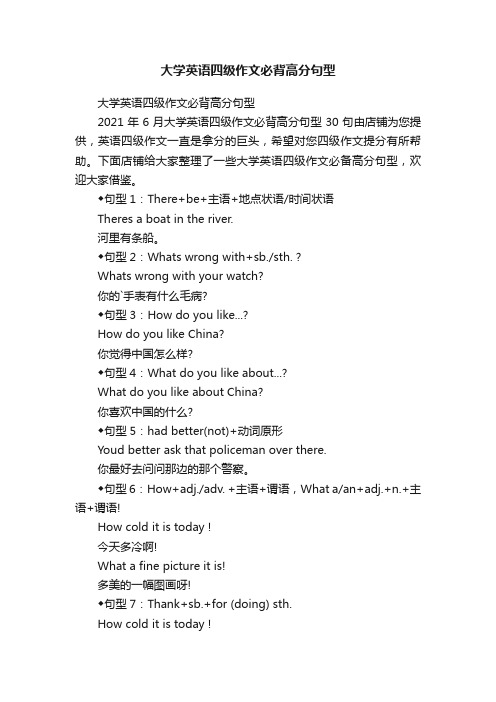
大学英语四级作文必背高分句型大学英语四级作文必背高分句型2021年6月大学英语四级作文必背高分句型30句由店铺为您提供,英语四级作文一直是拿分的巨头,希望对您四级作文提分有所帮助。
下面店铺给大家整理了一些大学英语四级作文必备高分句型,欢迎大家借鉴。
◆句型1:There+be+主语+地点状语/时间状语Theres a boat in the river.河里有条船。
◆句型2:Whats wrong with+sb./sth. ?Whats wrong with your watch?你的`手表有什么毛病?◆句型3:How do you like...?How do you like China?你觉得中国怎么样?◆句型4:What do you like about...?What do you like about China?你喜欢中国的什么?◆句型5:had better(not)+动词原形Youd better ask that policeman over there.你最好去问问那边的那个警察。
◆句型6:How+adj./adv. +主语+谓语,What a/an+adj.+n.+主语+谓语!How cold it is today !今天多冷啊!What a fine picture it is!多美的一幅图画呀!◆句型7:Thank+sb.+for (doing) sth.How cold it is today !Thank you for coming to see me.感谢你来看我。
◆句型8:So+be/情态动词/助动词+主语He is a student. So am I.他是一个学生,我也是。
◆句型9:...not ...until ...He didnt have supper until his parents came back.直到他的父母回来他才吃饭。
◆句型10:比较级+and+比较级The baby cried harder and harder.那孩子哭得越来越厉害。
大学英语四级考试重点笔记

6大学英语四级考试写作辅导笔记六类作文行文思路六类作文行文思路1. 现象解释型现象解释型2. 问题解决型问题解决型3. 对比选择型对比选择型4. 观点论证型观点论证型5. 记叙文记叙文6. 应用文应用文现象解释型写作模板---行文思路1 Topic首段(描述图表段)首段(描述图表段)⑴From/According to the chart/graph/table/picture, we clearly learn that 总述现象. ⑵Asearly as 图表中最早的时间,当时的数据. ⑶Then 一段时间一段时间later, 图表中数据的变化/ And (However), by 图表中数据发生显著变化的时间,图表中数据的显著变化.中间段(说明原因段)中间段(说明原因段)⑷ There are many reasons accounting for 现象或变化. / Then why 产生该现象或变化.⑸Firstly ,原因一. ⑹ 进一步说明原因一. ⑺Secondly ,原因二. ⑻ Finally, 原因三. (As a result, 以上原因导致的结果. )结尾段(阐述观点段/说明影响段/说明问题段)说明问题段)⑼As to me/ As far as I am concerned, "我"的态度相关情况或是现象将来的趋势、可能带来的(好或坏的)影响或存在的问题. ⑽For one thing, 理由一/影响一/问题一. ⑾Foranother/In addition/ Besides,理由二/影响二/问题二. ⑿ In brief/ To conclude, 总结全文(经常是提出建议或作出期望.现象解释型写作模板---行文思路2Topic首段(描述现象段)首段(描述现象段)⑴From/According to the chart/graph/table/picture, we clearly learn that 总述现象. ⑵现象表现或变化(表现一、二/变化一、二.) ⑶The reason for this phenomenon are varied./ There aremany different factors influencing 该现象或其他情况/说清楚原因.中间段(说明原因/影响段)影响段)⑷Among these reasons/factors, 原因一原因一 plays a critical role. /Undoubtedly, 该现象该现象have brought great (negative) effect on 影响对象. ⑹ 进一步说明原因一/影响一. ⑺ Secondly ,原因二/影响二. ⑻ In addition, 原因三/影响三.结尾段(阐述观点段/说明影响段/说明问题段)说明问题段)⑼No doubt/From my point of view, 对该现象做出总体评价对该现象做出总体评价. ⑽ However,可能存在的问题./ it is worth noting that 应该注意的事项. ⑾ 进一步描述问题或注意事项. ⑿All in all/Therefore, 总结全文.问题解决型写作模板---行文思路行文思路Topic首段(描述问题段)首段(描述问题段)⑴Nowadays/recently/In recent years, 问题问题is becoming more and more of a problem/has become quite a serious problem in /has aroused widespread attention/concern from.⑵问题表现一/原因一/危害性一⑶What's worse/In addition,问题表现二/原因二/危害性二危害性二中间段(说明危害/原因段)原因段)⑷ It is very clear that 该问题该问题 is bringing great harm to 危害对象危害对象/There are many factors resulting in 该问题该问题 / ⑸Above all, 危害一/Among these 原因一原因一plays a vital role.⑹ 进一步说明危害/原因一. ⑺ What's more ,危害二/原因二.结尾段(说明方法段)结尾段(说明方法段)⑻Considering the seriousness of 该问题, it is an urgent thing for us to take effectivemeasures to 解决该问题. ⑼First of all 方法一.⑽进一步阐述方法一/Secondly,方法二.⑾Thirdly/In addition,方法三. ⑿ Only through these ways, can the problem be solved./To conclude,it is everyone's responsibility to take effort to solve the problem.对比选择型写作模板---行文思路1Topic首段(提出观点段)首段(提出观点段)⑴When it comes to 谈论主题, there is no complete agreement among people/differentpeople will offer different ⑵Some people take it for granted/believe 一种观点/选择⑶However,others maintain /prefer 另一种观点另一种观点/选择. 中间段(对比论证段)中间段(对比论证段)⑷ Those people who hold the first opinion/make the former choice believe 观点/选择一的理由一. ⑸ (In addition,) in their eyes, they maintain/point out 观点/选择一的理由二. ⑹ However,still others think differently/ do not agree this. ⑺In their opinions, 观点/选择二的理由一. ⑻Besides, they argue 观点/选择二的理由二.结尾段(总结观点段)结尾段(总结观点段) ⑼Weighing up these two argument/choices/preferences, I prefer/am inclined to theformer/the latter one/"我"的选择.⑽ For one thing,理由一. ⑾ For another/What's more,理由二. ⑿Taking above-mentioned factors into consideration, we/ I may reasonably conclude/suggest 重申观点. / In a word, 提出建议.对比选择型写作模板---行文思路2Topic首段(提出观点段)首段(提出观点段)⑴Nowadays/In recent years, 一种现象. ⑵Some people 一些人的看法或做法,while others, 另一些人地看法或做法. ⑶ As to me, I prefer to/ am in favor of the former/latter.中间段(反面论证段)中间段(反面论证段)⑷ Of course, "我"不赞同观点的合理性. ⑸ For example, 支持其合理性的例./进一步阐述其合理性. ⑹ But it doesn't mean/it is worth noting that "我" 不赞同不赞同观点的不足. ⑺From my point of view/In my view, 我的不同观点.结尾段(正面论证段)结尾段(正面论证段)⑻The following reasons can account for/contribute to/support my argument. ⑼ First,理由一. ⑽ A good example to illustrate,支持理由一的例子/进一步说明理由一. ⑾ Second, 理由二.⑿ To conclude/From the foregoing,重申观点.观点论证型写作模板---行文思路行文思路Topic首段(提出观点段)首段(提出观点段)⑴Nowadays still many people believe/For years many people have such thought that 与论点冲突的背景观点或现象.⑵进一步说明背景观点或现象. ⑶However, 论点. ⑷The following reasons can support the argument.中间段(说明危害/原因段)原因段)⑸Undoubtedly, 论据一. ⑹进一步说明论据一. ⑺ Furthermore/Moreover,论据二. ⑻ For example ,支持论据二的事例/进一步说明论据二. ⑼ In addition/ What's more, 论据三.结尾段(总结观点段)结尾段(总结观点段)⑽ All mentioned above tell that 重申观点. ⑾ 进一步阐述论点. ⑿Therefore, we should正确态度或做法.记叙文写作模板---行文思路1Topic首段(描述背景段)首段(描述背景段)⑴背景事件⑴背景事件will come soon, 事件的重要性或意义.⑵There is no more appropriate time than this for 相关人员的态度或行动.⑶So on this special occasion, 我的愿望或打算.中间段(叙述经过段)中间段(叙述经过段)⑷ Now I still remember clearly 主题事件. ⑸Firstly ,原因一. ⑹ 进一步说明原因一.⑺Secondly ,原因二. ⑻ Finally, 原因三. (As a result, 以上原因导致的结果. )结尾段(阐述观点段)结尾段(阐述观点段) ⑼As to me/ As far as I am concerned, “我”的态度相关情况或是现象将来的趋势、可能带来的(好或坏的)影响或存在的问题. ⑽For one thing, 理由一/影响一/问题一. ⑾Foranother/In addition/ Besides,理由二/影响二/问题二. ⑿ In brief/ To conclude, 总结全文(经常是提出建议或作出期望.)记叙文写作模板---行文思路2Topic首段(描述背景段)首段(描述背景段)⑴简要介绍事件发生的时间, I witnessed 总述目击事件.⑵ 事件给人印之处, which isstill vivid in my mind./该事件was so 事件的突出特点that I was left a deep impression.中间段(叙述经过段)中间段(叙述经过段) ⑶It was/happened 事件开始时间,when 当时的情形. ⑷ ( Suddenly, ) 事件的发展一. ⑸ 事件的发展二. ⑹ 事件的发展三. ⑺As a result, 事件的最终结果或影响.结尾段(阐述观点段)结尾段(阐述观点段)⑻ 总述该事件带来的影响/事件产生的原因.⑼For one thing, 影响一/原因一/措施一. ⑽进一步说明影响一/原因一/措施一. ⑾For another, 影响二/原因二/措施二. ⑿Therefore, 总结全文(提出建议或作出期望).Or Such an incident teaches us an important moral, that is “我的感受或得到的启示. 感受一/行动一. Furthermore,感受二/行动二. In conclusion,I do believe that 总结全文。
大学英语四级必考语法汇总
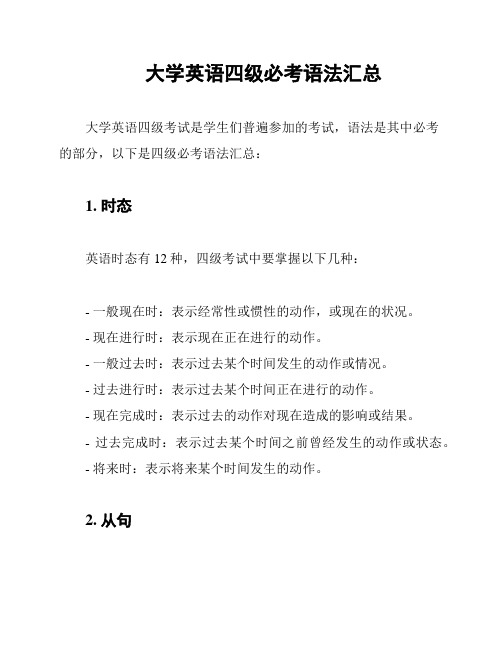
大学英语四级必考语法汇总大学英语四级考试是学生们普遍参加的考试,语法是其中必考的部分,以下是四级必考语法汇总:1. 时态英语时态有12种,四级考试中要掌握以下几种:- 一般现在时:表示经常性或惯性的动作,或现在的状况。
- 现在进行时:表示现在正在进行的动作。
- 一般过去时:表示过去某个时间发生的动作或情况。
- 过去进行时:表示过去某个时间正在进行的动作。
- 现在完成时:表示过去的动作对现在造成的影响或结果。
- 过去完成时:表示过去某个时间之前曾经发生的动作或状态。
- 将来时:表示将来某个时间发生的动作。
2. 从句从句是指一个完整的句子,它在句子中充当某个成分,四级考试中要掌握以下几种:- 定语从句:修饰某个名词或代词。
- 主语从句:作为主语的从句。
- 宾语从句:作为宾语的从句。
- 同位语从句:阐述前面名词或代词的内容。
- 状语从句:修饰或补充主句的内容。
- 结果状语从句:表示结果的从句。
- 让步状语从句:表示让步的从句。
- 条件状语从句:表示条件的从句。
3. 词性和词组四级考试中需要掌握名词、代词、动词、形容词和副词的用法,以及一些固定用法的词组,例如:- be based on:基于。
- be fond of:喜欢。
- as soon as possible:尽快。
- break the ice:打破僵局。
4. 语态英语语态有两种,四级考试中需要了解和区分主动语态和被动语态,以及两种语态在句子中的变化。
5. 语气英语语气有三种,四级考试中需要了解和区分陈述语气、祈使语气和虚拟语气。
以上就是大学英语四级必考语法的汇总,希望对大家备考有所帮助。
大学英语四级考试短语及必背句型
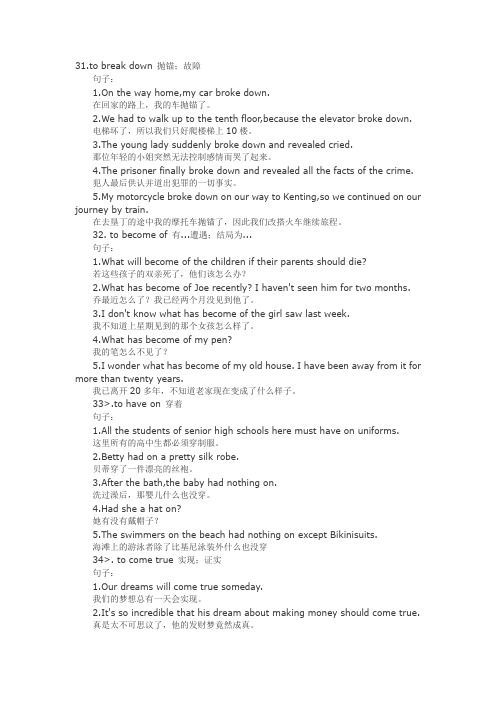
31.to break down 抛锚;故障句子:1.On the way home,my car broke down.在回家的路上,我的车抛锚了。
2.We had to walk up to the tenth floor,because the elevator broke down.电梯坏了,所以我们只好爬楼梯上10楼。
3.The young lady suddenly broke down and revealed cried.那位年轻的小姐突然无法控制感情而哭了起来。
4.The prisoner finally broke down and revealed all the facts of the crime.犯人最后供认并道出犯罪的一切事实。
5.My motorcycle broke down on our way to Kenting,so we continued on our journey by train.在去垦丁的途中我的摩托车抛锚了,因此我们改搭火车继续旅程。
32. to become of 有...遭遇;结局为...句子:1.What will become of the children if their parents should die?若这些孩子的双亲死了,他们该怎么办?2.What has become of Joe recently? I haven't seen him for two months.乔最近怎么了?我已经两个月没见到他了。
3.I don't know what has become of the girl saw last week.我不知道上星期见到的那个女孩怎么样了。
4.What has become of my pen?我的笔怎么不见了?5.I wonder what has become of my old house. I have been away from it for more than twenty years.我已离开20多年,不知道老家现在变成了什么样子。
大学英语四级必考语法知识点【精编版】

大学英语四级必考语法知识点时态1)现在完成进行时态(have/has been + -ing 分词构成): 动作或状态从过去某时开始,继续到现在,可能继续下去,也可能刚刚结束.I’ve been writing letters for an hour.I’ve been sitting in the garden.2)过去完成进行时(由had been + ing分词构成): 过去某个时刻以前一直在进行的动作I’d been working for some time when he called.We had been waiting for her for two hours by the time she came.3)将来完成进行时: 将来某个时刻以前一直在进行的动作.By next summer, he will have been working here for twenty years.In another month’s time she’ll have been studying here for three years.4)将来完成时(由shall/will have + 过去分词构成): 将来某时已发生的事.Ishall have finished this one before lunch.They’ll have hit the year’s target by the end of October.语态可以有两种被动结构的类型,例如:He was said to be jealous of her success.It was said that he was jealous of her success.能同时适用于上述两个句型的主动词通常都是表示“估计”,“相信”等意义的'动词,常见的有assume,believe,expect,fear,feel,know,presume,report,say,supp ose,understand等.It is supposed that the ship has been sunk.The ship is supposed to have been sunk.担当be supposed to 与不定式的一般形式搭配时往往表示不同的意义.例如:Why are you driving so fast in this area? You are supposed to know the speed to know the speed limit. (你应该晓得速度限制)双宾语及宾补结构的被动语态双宾语结构的被动语态: 双宾语结构变为被动语态时,可以把主动结构中的一个宾语变为主语,另一个宾语仍然保留在谓语后面,但多数是把间接宾语变为主语.He was asked a number of questions at the press conference.Two days were allowed them for making the necessary preparations.宾补结构的被动语态:She was called Big Sister by everybody.Then he was made a squad leader.He was considered quite qualified for the job.The room was always kept clean and tidy.短语动词Vi + advThe plane took off two hours late.Vi + prepThey looked round the Cathedral.Vi + prep (有被动语态)大学英语四级各题型分值一、英语四级作文说明:写作部分占整套试卷的15% =106.5分在这部分要达到63.9分为及格。
英语四级语法常用句型

英语四级语法常用句型在英语学习中,掌握一些常用的语法句型是非常重要的,它能够帮助我们更准确地表达自己的意思。
本文将介绍一些常用的英语四级语法句型,希望能对大家的英语学习有所帮助。
1. 主语 + 动词 + 宾语例如:I love English.She plays basketball.2. 主语 + 动词 + 间接宾语 + 直接宾语例如:He gave me a book.They bought us some gifts.3. 主语 + 动词 + 宾语 + 宾语补足语例如:He painted the wall red.She named her dog Lucky.4. 主语 + 动词 + 地点状语例如:They live in New York.We had dinner at a restaurant.5. 主语 + 动词 + 时间状语例如:He wakes up early every morning.They went to the beach last weekend.6. 主语 + be 动词 + 形容词例如:He is tall.She was happy.7. 主语 + be 动词 + 名词例如:That is a book.They were students.8. 主语 + be 动词 + 动词-ing例如:She is swimming.They were studying.9. 主语 + be 动词 + 过去分词例如:The cake is eaten.The letter was sent.10. It is + 形容词 + (for someone) + to do例如:It is difficult for me to understand.It is important for us to learn English.11. 如果句子中有两个谓语动词,第一个动词为be动词,第二个动词为不定式,可以使用:主语 + be 动词 + 动词不定式例如:She is going to study abroad.They were told to wait.12. 主语 + 动词 + as + 名词/形容词/副词 + as例如:He runs as fast as a cheetah.She sings as beautifully as an angel.以上就是一些常用的英语四级语法句型,通过掌握这些句型,我们可以更加准确地表达自己的观点和让别人理解自己的意思。
大学英语四级万能句型必背句型

大学英语四级万能句型必背句型1. bad news has wings. 好事不出门,坏事传千里。
2. barking dogs seldom bite. 吠犬不咬人。
3. beauty lies in the love’s eyes.情人眼里出西施。
4. be swift to hear, slow to speak. 听宜敏捷,言宜缓行。
5. better late than never. 不怕慢,单怕站。
6. better to ask the way than go astray. 问路总比迷路好。
7. between friends all is common. 朋友之间不分彼此。
8. birds of a feather flock together. 物以类聚,人以群分。
9. blood is thicker than water. 血浓于水。
10. blood will have blood. 血债血偿。
11. books and friends should be few but good. 读书如交友,应求少而精。
12. business is business.公事公办。
13. business is the salt of life. 事业是人生的第一需要。
14. by reading we enrich the mind, by conversation we polish it. 读书使人充实,交谈使人精明。
15. a bad beginning makes a bad ending. 不善始者不善终。
1. a bad thing never dies. 遗臭万年。
2. a bad workman always blames his tools. 不会撑船怪河弯。
3. a bird in the hand is worth than two in the bush.一鸟在手胜过双鸟在林。
大学英语四级翻译必备经典句型.doc
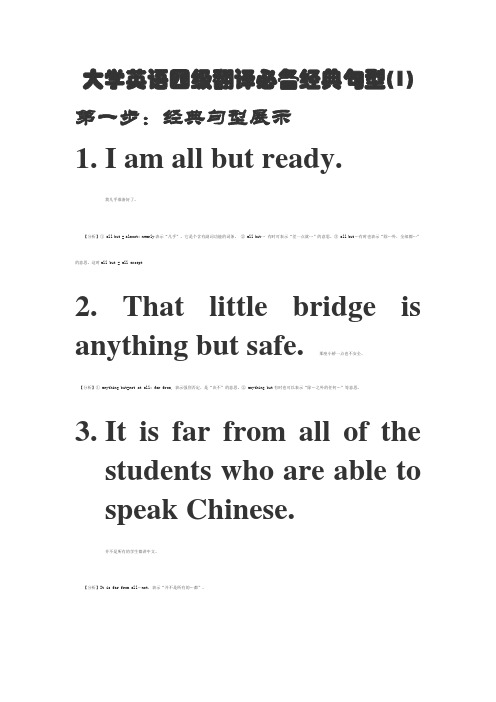
大学英语四级翻译必备经典句型(1) 第一步:经典句型展示1.I am all but ready.我几乎准备好了。
【分析】① all but = almost; nearly表示“几乎”。
它是个含有副词功能的词条。
② all but…有时可表示“差一点就…”的意思。
③ all but…有时也表示“除…外,全部都…”的意思,这时all but = all except2. That little bridge is anything but safe. 那座小桥一点也不安全。
【分析】① anything but=not at all; far from, 表示强烈否定,是“决不”的意思。
② anything but有时也可以表示“除…之外的任何…”等意思。
3.It is far from all of the students who are able to speak Chinese.并不是所有的学生都讲中文。
【分析】It is far from all…not. 表示“并不是所有的…都”。
4.You must leave her a message, and immediately at that.你必须给她留言,而且马上就要行动。
【分析】at that放于句尾表示强调第二步:练习与进步A. 翻译1. 过去的20年中,他几乎做好了所有的准备,差一点就可以毕业了。
2. 国庆就要到了,除他之外,所有的人都正在为此庆典准备着。
3. 并不是所有的外国游客都来自欧洲。
4. 他们两个都没有去过中国。
5. 由于交通堵塞,公交车不规律地向前移动,而且速度非常的慢。
6. 他独自一个人生活,但是一点儿也不觉得孤独。
7. 别听他的甜言蜜语,去年他把我骗了。
那是条披着羊皮的狼。
8. 我购物时,总请朋友们帮我选择颜色。
9. 除非在各方面都准备得周密,否则在应付入侵之敌的时候,我们将处于不利地位。
10. 除了一些无聊的行为外,我什么都喜欢。
2023年英语四级考试重点
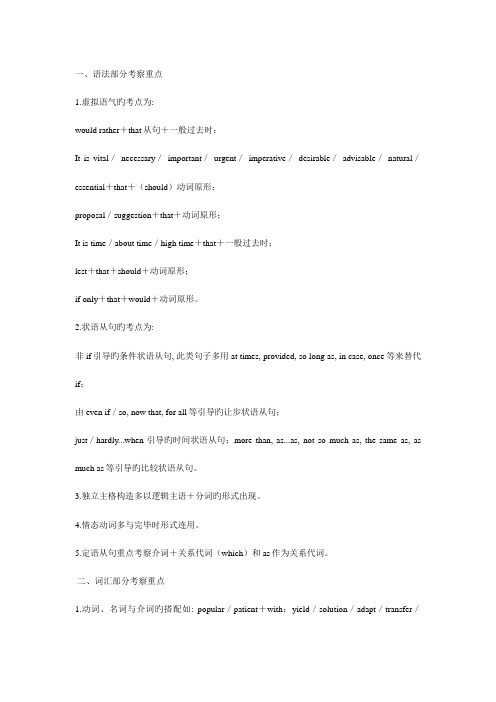
一、语法部分考察重点1.虚拟语气旳考点为:would rather+that从句+一般过去时;It is vital/necessary/important/urgent/imperative/desirable/advisable/natural/essential+that+(should)动词原形;proposal/suggestion+that+动词原形;It is time/about time/high time+that+一般过去时;lest+that+should+动词原形;if only+that+would+动词原形。
2.状语从句旳考点为:非if引导旳条件状语从句, 此类句子多用at times, provided, so long as, in case, once等来替代if;由even if/so, now that, for all等引导旳让步状语从句;just/hardly...when引导旳时间状语从句;more than, as...as, not so much as, the same as, as much as等引导旳比较状语从句。
3.独立主格构造多以逻辑主语+分词旳形式出现。
4.情态动词多与完毕时形式连用。
5.定语从句重点考察介词+关系代词(which)和as作为关系代词。
二、词汇部分考察重点1.动词、名词与介词旳搭配如: popular/patient+with;yield/solution/adapt/transfer/access+to;accuse/require+of;charge+for;under+discussion等等。
2.习常使用方法如:confess to/set about/be used to+doing;be supposed to/have/make sb. +do等。
3、由同一动词构成旳短语如: come, go, set, break等构成旳短语。
- 1、下载文档前请自行甄别文档内容的完整性,平台不提供额外的编辑、内容补充、找答案等附加服务。
- 2、"仅部分预览"的文档,不可在线预览部分如存在完整性等问题,可反馈申请退款(可完整预览的文档不适用该条件!)。
- 3、如文档侵犯您的权益,请联系客服反馈,我们会尽快为您处理(人工客服工作时间:9:00-18:30)。
分享∙孟绪颖∙∙孟绪颖的分享∙∙当前分享返回分享首页»分享新编大学英语5 翻译整理来源:☠李统宇☠的日志-----------------------------------------------新编大学英语5翻译整理-------------------------------------------------------------UNIT 1Complete the following sentences according to the text.∙ 1.Directly opposite him on the other side were two doors,exactly alike and side by side. L.9(一模一样,紧紧挨着)∙ 2.It was the duty and the privilege of the person on trial(受审者的义务和特殊待遇) t o walk directly to these doors.L.10∙ 3.He was subject to no guidance or influence, only chance. (L. 11) (不会得到任何提示,只有凭运气).∙ 4. The tiger immediately sprang upon him and tore him to pieces as punishment for his guilt.L.13(扑向他,将他撕得四分五裂,作为对他所犯罪行的惩罚)∙ 5. It didn’t matter that he might posses a wife and family or that his affections mi ght be engaged upon a lady of his own selection.(L.17) (有妻小或心有所属)∙ 6. This was the king’s method of administering justice.L.21_(进行裁决的方式)∙7. He was rewarded on the spot. L.23(当场)∙8.She was the apple of his eye(他的掌上明珠)and he loved her above all humanity.(胜过爱任何人)(L.26)∙9. Young and beautiful maidens were carefully surveyed(进行了甄选) in order that t he young man might have a suitable bride if fate did not determine for him a differ ent destiny.(L. 34)(以备此人命不该绝).∙10.(她的心像被灼烧一样)Her soul had burned with agony as she imagined him rushi ng to meet that woman with her sparking eyes of triumph.L.85(眼里充满胜利的喜悦).∙12.It had been made after days and nights of anguished thought.L.90(日日夜夜痛苦思索)∙13.It is not for me to presume to set myself up as the one person able to answer it.L.95_(想当然把自己当作唯一能够回答这问题的人).UNIT 3∙ 1. I learned that saving the rain forests is more than an environmental necessity.(L.10) (不仅仅是环境的需要)∙ 2.In our case, it is an opportunity to pursue business opportunities that use creativity and technology to substitute for trees, for resources of any kind.(L.12)(替代树木以及任何资源)∙ 3.Not limited by rules,but motivated by objectives.( L.24) (而应用目标去激励)∙ 4.When I visited the rain forest, I realized that it was a model of the perfect learni ng organization, a place that excels by learning to adapt to what it doesn’t have.(L.27)(适应自己的不足之处)∙ 5. At Mitsubishi Electric, we have begun to adopt an environmental management sys tem founded on principles of industrial ecology.(L.37)(根据工业生态原理建立的)∙ 6.Each company retains its independence, its specialty, and its core competence.(L.68)(保持自己的独立性、自己的特色和自己的核心技术。
)∙7.The same can be true(也能这样) in our economy.(L.72)∙8.I am often asked whether the needs of the corporation and the needs of the envi ronment are in conflict.( 有冲突)I do not believe they are.In the long run, ( 从长远看) they can’t be. ( P.77)∙9. Conventional wisdom is that the highest mission of a corporation is to maximize profits and return to shareholders.(L.79)(获取最大的利润、给股东们最大的回报).∙10. So profits are not an end; they are a means to an end.(L.82)(达到目的的手段)UNIT 4∙ 1.Surely in every country people value friendship.(L.5)珍视友谊∙ 2. Friendship is usually more particularized(更具体)and carries a heavier burden of co mmitment.(L.11)(意味着更多的承诺和义务)∙ 3.A friendship may be superficial, casual, situational or deep and enduring.(L.15)(肤浅的、偶然的、应景的、也可以是深厚持久的).∙ 4.Friendship is a one-to-one relationship(一对一的关系)that demands a keen awarenes s of the other person’s intellect, temperament and particular interests.(L.27)(非常熟悉彼此的才智、性情和嗜好).∙ 5. Adolescents, boys and girls,form deeply sentimental attachments, (彼此间会形成一种感情上的依赖)walk and talk together ---not so much to polish their wits as to sha re their hopes and fears and dreams, to form a common front against the world of school and family(与其说是为了激发彼此的聪明才智,不如说是为了倾述各自的希望、忧虑和憧憬,为了团结一致共同对付学校和家庭)and to join in a kind of mutual discov ery of each other’s and their own inner life.(L. 48)∙ 6. Lively disagreement and sharpness of argument are the breath of life.(L.60)(所必不可少的)∙7. Like ties of kinship, (亲情纽带), ties of friendship are meant to be permanently bin ding.(L.63)(是永远联系在一起的).∙8. Meeting after a long interval, friends are like a couple who begin to dance again when the orchestra strikes up after a pause.( L78)(一对随着乐队休息片刻后又翩翩起舞的舞伴一样).∙9. And between friends there is inevitably a kind of equality of give-and-take.(L.95)(一种互谅互让的平等关系).∙10. English friendships are formed outside the family circle, but they are not, as in G ermany,complementary to the family(与家庭生活结合在一起)nor are they, as in Fran ce, separated form the family.(L.78)UNIT 5∙ 1.What attitudes, activities, and priorities engender a sense of well-being(L.5)(能使人快乐) ?∙ 2. Although the scientific pursuit of happiness has recently mushroomed,speculations about happiness are age-old. (L.7)(对快乐的思索却自古有之)∙ 3.Social scientists have exploded some myths( L.19)(推翻了一些错误观念)about who’s happy and who’s not by identifying predictors of happiness and life satisfaction.∙ 4. And teens, unlike adults, typically rebound from either gloom or joy within an ho ur‘s time.(L.25)(他们的愁闷或快乐不到一小时就完全过去了).∙ 5. Are women happier because of their supposedly greater capacity for intimacy and social connection?(L.30)(似乎更具亲和力、更善于社交)∙ 6.Like age, gender gives no clue to subjective well-being(L.32).(同个人感觉上的幸福感也没有必然的联系).∙7. With each of these trait-happiness correlations,the causal arrows are uncertain.(L.67)(哪个是‚因‛哪个是‚果‛还不确定)∙8. Yet happiness seems changeable only within limits imposed by our genetic makeu p(L.75)(在我们的基因组所限定的范围内)∙9. Depending on our outlooks and recent experiences,ourhappiness fluctuates around our happiness set point(line 79)(围绕一个固有值上下浮动), which disposes some peo ple to be ever cheerful and others gloomy.∙10.The most significant alternative to aloneness(结束孤寂生活的最有效方法)is marria ge.∙11.婚姻美满如添翼,勉强结合似牢笼。
